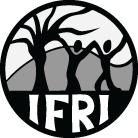Themes
Members of the IFRI research network have backgrounds in many disciplines, and are interested in asking a variety of questions about the governance of community forests. However, much of the core work within IFRI focuses on one or more of four key natural resource themes: biodiversity, livelihoods, institutions and forest carbon.
Biodiversity
Tropical forests are the most diverse habitat on the planet. Human activities within forests often alter biodiversity either directly (e.g. by hunting, or by collecting forest products for use or for sale) or indirectly (e.g. by fragmentation, or by over-harvesting keystone species). The interaction between communities and the forests that they access are key in determining the extent to which biodiversity is maintained.
Livelihoods
More than 1.2 billion people (about 20% of the world’s population) directly depend on forests for either subsistence or income. People collect food, medicine, and materials for construction from forests. People living near to or within forest areas are frequently among the world’s poorest, and access to these resources effectively subsidizes their livelihoods, provides a source of income, and acts as a safety net following environmental or economic shocks. Resource depletion as a consequence of over-harvesting, forest degradation or forest cover depletion poses a direct threat to these provisioning services.
Institutions
Defined as the formal and informal mechanisms that shape social and individual expectations, interactions, and behavior, institutions are integral to the sustainable management of common pool natural resources. Community forests are often associated with specific user-groups that are independent of formal state government and which often govern forests with greater success. Local communities often have vested interests in long-term sustainability, and so specifically-designed rules that are informed by local knowledge and enforced by these user-groups often results in successful management in decentralized governance contexts.
Forest Carbon
When IFRI was founded in 1992, the study of forest carbon was a fringe discipline. Today, it is at the forefront of the climate change discourse. Forests are stores of carbon, locked within above- and below-ground biomass; they can also be huge sources of atmospheric carbon emissions when cleared or burned; and they act as carbon sinks when left standing and intact. The emergence of REDD+ and other strategies to maintain forest cover have therefore become a key component of climate change mitigation.
News
IFRI Special Issue Collaboration
(17/09/2016)
FLARE Announces Keynote Speakers

